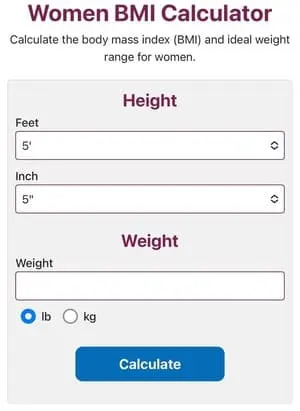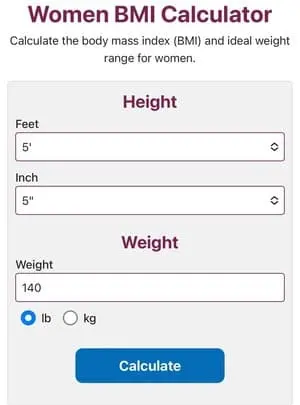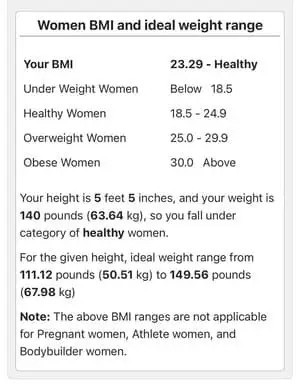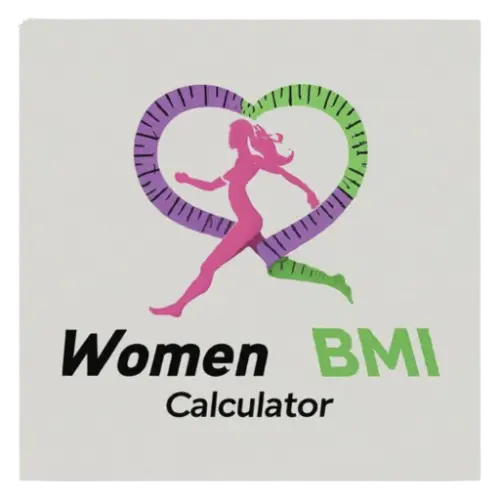What is a Women BMI Calculator?
The Women BMI Calculator is an online tool to help women calculate their Body Mass Index (BMI) based on their height and weight. BMI is a widely used indicator of body fat and provides information about whether a woman is underweight, normal weight, overweight, or obese.
It takes inputs like height and weight (in either metric or imperial units) to give a personalized BMI result.
The BMI score categorizes women into different weight categories: underweight, normal weight, overweight, or obese.
How to Use Women BMI Calculator?
Enter your weight and height into the calculator, and it will instantly provide your BMI value and corresponding weight category.
To use a Women BMI Calculator effectively, follow these steps:
Step 1: Input Your Height
Select your height in feet and inches: In the dropdown menus, select the number of feet (e.g., 5 feet). In the next dropdown, select the number of inches (e.g., 4 inches).

Step 2: Input Your Weight
Enter your weight: In the text box, type in your weight. Ensure it is entered in pounds (lbs.) or kilograms (kg).
Choose weight unit: Select pounds (lbs.) or kilograms (kg) by clicking the suitable radio button.

Step 3: Click the "Calculate" Button
Once you have entered your height and weight, click the "Calculate" button to get your BMI.

Step 4: Review Your BMI Results
Your Body Mass Index (BMI) will be displayed, along with a category (e.g., underweight, healthy, overweight, or obese).
Step 5: Check Ideal Weight Range
The calculator will also provide the ideal weight range for your height so that you can compare your current weight.
Important Notes:
BMI ranges are based on general health guidelines but may not apply to pregnant women, athletes, or bodybuilders.
Different BMI Charts for Women
| Weight Category | BMI Range |
|---|---|
| Underweight | BMI less than 18.5 |
| Normal weight | BMI between 18.5 and 24.9 |
| Overweight | BMI between 25 and 29.9 |
| Obesity class I | BMI between 30 and 34.9 |
| Obesity class II | BMI between 35 and 39.9 |
| Obesity class III (severe obesity) | BMI 40 or higher |
| Height (feet and inches) | Height (cm) | Weight Range for Normal BMI (lbs and kg) |
|---|---|---|
| 4'10" | 147 | 91 - 123 lbs. (41 - 56 kg) |
| 4'11" | 150 | 94 - 127 lbs. (43 - 58 kg) |
| 5'0" | 152 | 97 - 131 lbs. (44 - 59 kg) |
| 5'1" | 155 | 100 - 135 lbs. (45 - 61 kg) |
| 5'2" | 157 | 104 - 140 lbs. (47 - 64 kg) |
| 5'3" | 160 | 107 - 145 lbs. (49 - 66 kg) |
| 5'4" | 163 | 110 - 150 lbs. (50 - 68 kg) |
| 5'5" | 165 | 114 - 155 lbs. (52 - 70 kg) |
| 5'6" | 168 | 118 - 160 lbs. (54 - 73 kg) |
| 5'7" | 170 | 121 - 165 lbs. (55 - 75 kg) |
| 5'8" | 173 | 125 - 169 lbs. (57 - 77 kg) |
| 5'9" | 175 | 128 - 174 lbs. (58 - 79 kg) |
| 5'10" | 178 | 132 - 179 lbs. (60 - 81 kg) |
| 5'11" | 180 | 136 - 184 lbs. (62 - 83 kg) |
| 6'0" | 183 | 140 - 189 lbs. (64 - 86 kg) |
The Science Behind Our Women BMI Calculator
Our Women BMI Calculator uses a scientifically proven formula to estimate Body Mass Index (BMI), a key indicator of body fat based on your height and weight.
The BMI formula works by dividing your weight in kilograms by the square of height in meters. If you prefer imperial measurements, we convert the values for you, ensuring accurate results.
BMI is widely recognized by health professionals as a reliable measure of whether you have a healthy body weight for your height. This calculator categorizes your BMI into different health ranges: underweight, normal weight, overweight, or obese.
While BMI is a useful tool, it does not consider muscle mass, bone density, and overall body composition.
Benefits of Using the Women BMI Calculator
- Quick and Easy to Use: The Women's BMI Calculator offers a fast, convenient way to determine your BMI without the hassle of manual calculations. With just your height and weight, you'll receive immediate results, saving you time and effort.
- Personalized Health Insights: BMI provides valuable insights into your health. With this information, you can make better decisions about your diet, fitness, and overall lifestyle, helping you to take control of your wellness.
- Goal Setting and Monitoring: Whether you're looking to lose weight, gain muscle, or maintain your current weight, the Women's BMI Calculator helps you set and track your health goals. Regularly monitoring your BMI keeps you on the right path toward achieving your fitness objectives.
- Educational Tool: Beyond being a simple calculator, it's also a valuable educational resource. It helps you understand the importance of maintaining a healthy weight and highlights the potential health risks associated with being underweight, overweight, or obese.
Limitations of Women BMI Calculator
Women's BMI Calculator is a useful tool for estimating body fat based on weight and height, but it does have limitations. Here are some important factors to consider:
- Doesn't Account for Muscle Mass: The BMI formula doesn't differentiate between muscle and fat. Athletes or women with high muscle mass may be classified as overweight or obese, even though their body fat is low.
- Doesn't Consider Age or Body Composition: BMI does not work for the natural changes in body composition that occur with age, such as muscle loss or increased fat in specific areas.
- Inaccurate for Pregnant Women: Pregnancy leads to natural weight gain, which affects BMI. The calculator is not suited to evaluate the weight of expected mothers.
- No Insight into Fat Distribution: BMI does not provide information on where body fat is distributed, which can be an important factor in assessing health risks, such as abdominal obesity.
- Health Conditions Not Considered: It doesn't consider bone density, hormonal changes, or metabolic disorders that can affect weight.
Features of the Women BMI Calculator
The Women BMI Calculator is a powerful tool designed to help women easily assess their body mass index and understand their health status. Here are the key features that make this calculator a must-use for women:
User-Friendly Interface and Design
The calculator has an intuitive and simple interface, ensuring that women can easily navigate and input their information without any hassle. The design is clean, providing a seamless user experience.
Accurate Input Requirements: Height and Weight
For accurate BMI results, the calculator requires users to input their height and weight. These factors help in correct calculation, ensuring the results accurately reflect the user's health status.
Privacy and Data Security
No personal data is stored in any database, giving users peace of mind that their information is only used for immediate calculation.
Imperial and Metric Unit Options
To cater to users worldwide, the calculator offers both imperial (feet, inches, pounds) and metric (kilograms) measurement units. This flexibility ensures that users can input their data in the format they are most comfortable with.
Accessibility Features
The calculator is accessible to users with disabilities. It supports screen readers, provides adjustable font sizes, and offers high-contrast color options to ensure that the tool can be used by everyone.
Quick and Accurate Results
With just a few inputs, the Women BMI Calculator provides quick and accurate results, users instantly get their BMI and understand whether they fall into the underweight, normal, overweight, or obese category.
What is the average female BMI by age?
The average female BMI can vary across different age groups due to factors such as growth, development, and changes in body composition.
Childhood (up to age 12):
The average BMI for girls in this age range can vary significantly due to differences in growth rates and body development. It is best to consult with a pediatrician for accurate estimates.
Adolescence (ages 13-19):
The average BMI for adolescent girls typically falls within the range of 19 to 24.
Early adulthood (ages 20-39):
The average BMI for women in their early adulthood years is often within the range of 20 to 25.
Middle adulthood (ages 40-59):
The average BMI for women in their middle adulthood years may slightly increase compared to earlier stages. The average BMI range for this age group is often between 22 to 27.
Older adulthood (age 60 and above):
In older adulthood, the average BMI may tend to decrease slightly. The average BMI range for women in this age group is between 23 to 28.
